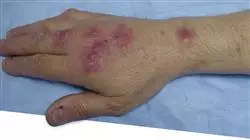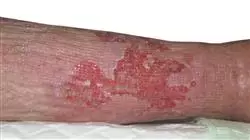University certificate
The world's largest faculty of medicine”
Introduction to the Program
Renew your knowledge on the most common infectious diseases in the world such as Mycobacterium ulcerans"

This Postgraduate diploma is oriented to medical professionals specialized in infectious diseases, who seek to expand and update knowledge in this field and incorporate it to the usual clinical practice, either from the point of view of diagnosis, treatment or prevention.
Over time, the grouping of mycobacteria not included in the tuberculosis and leprosy complexes has been referred to by different names. Nowadays, these should be individualized and named according to their scientifically accepted binomial name. In this Postgraduate diploma, students will learn about their microbiological characteristics, the main clinical pictures and the different therapeutic options available for the Mycobacterium avium complex and non-tuberculosis mycobacteria such as M. kansasii, M. xenopi, M. scrofulaceum, M. haemophilum, M. ulcerans, M. gordonae and M.genavense.
Likewise, during the 6 months of this online degree, the healthcare professional will deal with the different clinical pictures of other non-tuberculous mycobacteria such as M. abscessus, M. chelonae, M. malmoense or M. simiae for which the highly qualified teaching team with extensive experience in this area will provide the latest studies carried out in this area.
In addition, and despite the fact that leprosy currently has a lower incidence compared to tuberculosis, its presence in much of the world makes necessary the renewal of knowledge in this field by health personnel. In this sense, the Postgraduate diploma will address the evolution of the disease and the prevention and control measures.
The course is taught entirely online, providing students with the opportunity to keep abreast of the latest developments in infectious diseases with multimedia content at the forefront of academia and with a learning system, Relearning, which will allow healthcare professionals to update all their knowledge in a simple and agile way.
Acquaint yourself in detail with this Postgraduate diploma on the latest treatments used in HIV patients and apply the best strategies".
This Postgraduate diploma in Non-Tuberculous Mycobacterial Infections contains the most complete and up-to-date scientific program on the market. The most important features include:
- The development of practical cases presented by experts in Medicine and Microbiology
- The graphic, schematic, and practical contents with which they are created, provide scientific and practical information on the disciplines that are essential for professional practice
- Practical exercises where self-assessment can be used to improve learning
- Its special emphasis on innovative methodologies
- Theoretical lessons, questions to the expert, debate forums on controversial topics, and individual reflection assignments
- Content that is accessible from any fixed or portable device with an Internet connection
The multimedia content of this degree will guide you through the latest studies on fast-growing mycobacteria, a common water pollutant"
The program’s teaching staff includes professionals from sector who contribute their work experience to this educational program, as well as renowned specialists from leading societies and prestigious universities.
Its multimedia content, developed with the latest educational technology, will provide the professional with situated and contextual learning, i.e., a simulated environment that will provide an immersive education programmed to learn in real situations.
The design of this program focuses on Problem-Based Learning, by means of which the professional must try to solve the different professional practice situations
that are presented throughout the academic course. For this purpose, the student will be assisted by an innovative interactive video system created by renowned experts.
Learn more about the new diagnostic techniques used to treat elderly or immunocompromised patients"

Renew your knowledge with a team of highly qualified specialists in infectious diseases"
Why study at TECH?
TECH is the world’s largest online university. With an impressive catalog of more than 14,000 university programs available in 11 languages, it is positioned as a leader in employability, with a 99% job placement rate. In addition, it relies on an enormous faculty of more than 6,000 professors of the highest international renown.

Study at the world's largest online university and guarantee your professional success. The future starts at TECH”
The world’s best online university according to FORBES
The prestigious Forbes magazine, specialized in business and finance, has highlighted TECH as “the world's best online university” This is what they have recently stated in an article in their digital edition in which they echo the success story of this institution, “thanks to the academic offer it provides, the selection of its teaching staff, and an innovative learning method aimed at educating the professionals of the future”
A revolutionary study method, a cutting-edge faculty and a practical focus: the key to TECH's success.
The most complete study plans on the university scene
TECH offers the most complete study plans on the university scene, with syllabuses that cover fundamental concepts and, at the same time, the main scientific advances in their specific scientific areas. In addition, these programs are continuously being updated to guarantee students the academic vanguard and the most in-demand professional skills. In this way, the university's qualifications provide its graduates with a significant advantage to propel their careers to success.
TECH offers the most comprehensive and intensive study plans on the current university scene.
A world-class teaching staff
TECH's teaching staff is made up of more than 6,000 professors with the highest international recognition. Professors, researchers and top executives of multinational companies, including Isaiah Covington, performance coach of the Boston Celtics; Magda Romanska, principal investigator at Harvard MetaLAB; Ignacio Wistumba, chairman of the department of translational molecular pathology at MD Anderson Cancer Center; and D.W. Pine, creative director of TIME magazine, among others.
Internationally renowned experts, specialized in different branches of Health, Technology, Communication and Business, form part of the TECH faculty.
A unique learning method
TECH is the first university to use Relearning in all its programs. It is the best online learning methodology, accredited with international teaching quality certifications, provided by prestigious educational agencies. In addition, this disruptive educational model is complemented with the “Case Method”, thereby setting up a unique online teaching strategy. Innovative teaching resources are also implemented, including detailed videos, infographics and interactive summaries.
TECH combines Relearning and the Case Method in all its university programs to guarantee excellent theoretical and practical learning, studying whenever and wherever you want.
The world's largest online university
TECH is the world’s largest online university. We are the largest educational institution, with the best and widest online educational catalog, one hundred percent online and covering the vast majority of areas of knowledge. We offer a large selection of our own degrees and accredited online undergraduate and postgraduate degrees. In total, more than 14,000 university degrees, in eleven different languages, make us the largest educational largest in the world.
TECH has the world's most extensive catalog of academic and official programs, available in more than 11 languages.
Google Premier Partner
The American technology giant has awarded TECH the Google Google Premier Partner badge. This award, which is only available to 3% of the world's companies, highlights the efficient, flexible and tailored experience that this university provides to students. The recognition as a Google Premier Partner not only accredits the maximum rigor, performance and investment in TECH's digital infrastructures, but also places this university as one of the world's leading technology companies.
Google has positioned TECH in the top 3% of the world's most important technology companies by awarding it its Google Premier Partner badge.
The official online university of the NBA
TECH is the official online university of the NBA. Thanks to our agreement with the biggest league in basketball, we offer our students exclusive university programs, as well as a wide variety of educational resources focused on the business of the league and other areas of the sports industry. Each program is made up of a uniquely designed syllabus and features exceptional guest hosts: professionals with a distinguished sports background who will offer their expertise on the most relevant topics.
TECH has been selected by the NBA, the world's top basketball league, as its official online university.
The top-rated university by its students
Students have positioned TECH as the world's top-rated university on the main review websites, with a highest rating of 4.9 out of 5, obtained from more than 1,000 reviews. These results consolidate TECH as the benchmark university institution at an international level, reflecting the excellence and positive impact of its educational model.” reflecting the excellence and positive impact of its educational model.”
TECH is the world’s top-rated university by its students.
Leaders in employability
TECH has managed to become the leading university in employability. 99% of its students obtain jobs in the academic field they have studied, within one year of completing any of the university's programs. A similar number achieve immediate career enhancement. All this thanks to a study methodology that bases its effectiveness on the acquisition of practical skills, which are absolutely necessary for professional development.
99% of TECH graduates find a job within a year of completing their studies.
Postgraduate Diploma in Non-Tuberculous Mycobacterial Infections
By taking TECH's Postgraduate Diploma in Non-Tuberculous Mycobacterial Infections, you will be able to acquire knowledge and skills that will open up various career opportunities in the field of health, research and microbiology. With this program, you will learn about the evolution and current problems of infections caused by non-tuberculous mycobacteria, which will allow you to better understand the importance and prevalence of these infections today. In addition, you will learn the microbiological characteristics, clinical picture and treatment of various nontuberculous mycobacteria such as M. avium complex, M. kansasii, M. ulcerans, M. genavense, M. haemophilum, M. marinum, M. scrofulaceum and M. gordonae. You will also learn about the evolution and current problems of infections caused by other non-tuberculous mycobacteria such as M. abscessus, M. chelonae, M. fortuitum complex, M. malmoense, M. simiae, M. szulgai, M. xenopi, among others.
You will configure the professional background you want in the field of non-tuberculous mycobacterial infections
With this Postgraduate Diploma in Non-Tuberculous Mycobacterial Infections, you will learn about the reservoirs and the different routes of transmission of infection by the Mycobacterium leprae complex and you will learn about the different clinical classifications of the disease and its anatomopathological study. You will learn the diagnostic techniques and treatment of this infection, including the development of resistance. As this is a 100% online program, you will have the convenience and flexibility to learn at your own pace, with no time or geographical location restrictions. In addition, you will have access to specialized tutors who will guide you at all times and provide you with the support you need to achieve your professional goals. With this course, you will be able to expand your knowledge in microbiology and you will be better prepared to develop your professional career in health and research.







